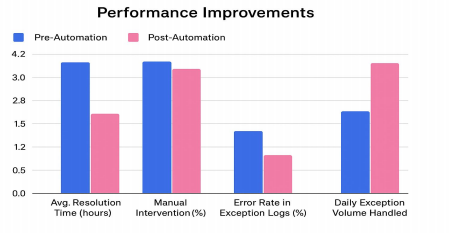Transforming Back-Office Operations: An Empirical Study of AI-Driven Process Automation in Trade Exception Workflows
DOI:
https://doi.org/10.21276/jccci.2025.v1.i2.4Keywords:
Artificial Intelligence, Process Automation, Trade Exceptions, Back-Office Operations, Machine Learning, Natural Language Processing, Robotic Process Automation, Financial Services, Operational Efficiency, Intelligent WorkflowsAbstract
With the changing face of financial services, operational efficiency, regulatory compliance, and scalability gain increasing relevance. Among these concern areas of interest is the management of trade exception workflows in back-office operations. Trade exceptions—are trade processing irregularities due to out-of-sync data, counterparty mistakes, or system failure—historically depend on manual inquiry and rule-based decisioning processes. These kinds of methods are typically awkward, buggy, and inflexible that is necessary in the present high-frequency trading world. This case study is an examination of the process transformation that process automation using AI caused in exception handling in global trade in a global investment bank. Using natural language processing (NLP), machine learning (ML), and robotic process automation (RPA) deployment, the bank transformed its exception handling system to its fundamental levels. The answer realized via automated classification of exception types, cognitive extraction of data from unstructured documents, and automation of cure activities with success via robots. The evaluation involved a nine-month monitoring period of before-and-after implementation measures in exception resolution time, error rate, manual intervention, and operating throughput categories. Outcomes indicated an average resolution time reduction of 64%, manual intervention reduction by 51%, and significant improvement in exception log accuracy. Furthermore, the automation framework improved operations' scalability to support a 50% growth in daily trade exceptions without an increase in personnel. These results highlight the necessity of integrating AI into business processes, not as an additional tool but as a part of an intelligent decision-making and action system. The study also determines data quality, user adoption, and governance as key challenges to be addressed to ensure successful adoption. This article is a contribution to the growing body of literature in smart financial automation, offering an applied handbook for institutions looking to automate middle and back-office activities using AI.
Downloads

Downloads
Published
Versions
- 2025-07-28 (2)
- 2025-07-26 (1)
Issue
Section
License
Copyright (c) 2025 Journal of Cognitive Computing and Cybernetic Innovations

This work is licensed under a Creative Commons Attribution-NonCommercial 4.0 International License.





